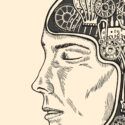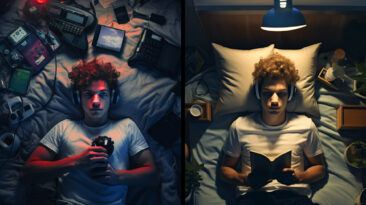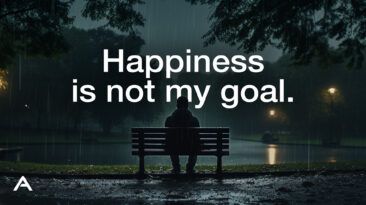The year is 1665 and Isaac Newton is looking out his window at an apple tree standing tall in his orchard in Lincolnshire, England. All of a sudden, a ripe and lonely apple falls from the tree and makes its way to the ground.
While most people would consider this a mundane event, Newton followed its trajectory with great interest. What young Isaac didn’t know at the time was that this apple would become the most famous piece of fruit in human history, as its natural attraction to the ground would spark a moment of genius, leading him to create the laws of motion that revolutionized modern physics.
Newton wasn’t conducting an experiment when he discovered the laws of gravity, he wasn’t overloading his brain with information trying to figure it out, he was simply looking aimlessly outside his window. He was bored.
But that was in the 17th Century. Times have changed a lot since then. These days, we hardly ever allow ourselves to just stare out a window or sit in our backyards doing nothing but staring at the sky. We never pause for a moment and just let our minds wander into deep unexplored territories.
Turns out that diving deep into our own thoughts is something that we don’t really like to do. We find it boring, and we’ll do anything to alleviate boredom, even if it means subjecting ourselves to self-inflicted electric shocks. This, sadly, is not an exaggeration.
In a study conducted at the University of Virginia, a social psychologist named Timothy Wilson recruited hundreds of student volunteers to take part in what he called “thinking periods”.
Individuals were placed in small rooms with blank walls and no personal belongings. They were asked to entertain themselves with nothing but their thoughts for just 6 to 15 minutes. When asked to rate their experience afterward, about 50% of the volunteers did not like being alone with their thoughts citing “it was boring.” Then, researchers left the volunteers in the room for another 15 minutes. This time, though, they introduced a button that participants could press to shock themselves if they wanted to. Around 67% of men and 25% of women chose to voluntarily inflict pain on themselves rather than just sit and do nothing. This research suggests that, sadly, a lot of us would rather experience physical pain that sit in our own thoughts.
In the spring and summer of 1665, an outbreak of Bubonic plague spread through London and by July had claimed more than 17,000 lives. Almost at once, people throughout the city began fleeing to the countryside isolating themselves in fear for their lives.
Among those who fled was none other than Sir Isaac Newton. Of course, at that time, Newton had not yet been knighted. In fact, he had not yet even witnessed the famous apple falling.
Interestingly though, his two years spent in isolation, away from the bells, whistles, and distractions of the city was the time when Newton’s genius came to life and he was able to invent calculus, create the science of motion, and develop a framework for gravity.
These two years spent in quarantine were Newton’s own 15 minutes isolated in a room with nothing to do. Newton, however, didn’t seek external stimuli to prevent his mind from wandering. Instead he welcomed the boredom that often comes with deep thinking and stared out the window, which has, without a doubt, paid dividends for all of humanity.
During this isolation in the countryside, Newton also invented Calculus. Throughout his life, he also made major discoveries in optics, proposing that white light is actually a combination of light from all of the color spectrum. Most famously, following his apple incident, he developed the three laws of motion.
In all fairness, attributing Newton’s greatest accomplishments to him being quarantined in the countryside is a bit misleading. The truth is, the incident of the apple falling wasn’t an isolated moment of genius. Newton’s various contributions to science were the product of years of hard work and dedication, tediously working towards these moments of revelation.
However, it is still helpful to recognize the importance of solitude and boredom in creating that particular eureka moment. According to psychologist Dr. Sandi Mann of the University of Central Lancashire, once we start daydreaming and allow our brains to wander like Newton did when he looked out the window, we start thinking beyond the conscious and into the subconscious which allows for all sorts of connections to take place.
This is called the default mode. When you’re bored or performing mundane tasks like doing the dishes or folding the laundry, your body may be on autopilot, but your brain is actually pretty busy.
When in the default mode, your mind gets the chance to connect different ideas, try and solve some of your most pressing problems, and even create personal narratives or set goals.This is why programmers often tell you that they figured out the problem with their code just as they were jumping into bed – ready to get some shut eye. Or, why you feel like your best ideas come in the shower.
The problem is that today, those are the very rare moments that we allow ourselves to be bored. Every other time, we almost always choose the electric shock instead.
Living in a society where we have the entire world of entertainment on our fingertips has led to our immediate dissatisfaction with even seconds of boredom. The more we fill our world with fast-moving, high-intensity stimulation, the more we get used to it, and the less of a tolerance we have for boredom.
On average, Americans reach for their phones 344 times a day. That’s once every four minutes. From quick email checks to diving down the rabbit hole of reels and memes, Americans spend an average of two hours and 54 minutes on their phone each day, with some people clocking up to 10 hours a day on their phones.
Without a doubt, technology has definitely made the world a better place, but this unhealthy dependent relationship we have with our phones is robbing us of our most creative selves.
German psychologist, Theodor Lipps, proposed one of the first definitions of boredom in 1903 saying “boredom is a feeling of displeasure arising out of a conflict between a need for intense mental activity and lack of incitement to it, or inability to be incited”.
In other words, It’s an underwhelming state where none of the options available to us seem appealing. Instead of letting this feeling run its course, we overstimulate our brain and prevent it from taking advantage of the true power of this downtime.
Our first instinct when we experience boredom is to endlessly scroll through feeds, switching through social media apps – even when we’re just walking from one room to the next or waiting for the cashier to bag our groceries.
We’ve become conditioned to constantly seek out novelty and deliver a hit of dopamine to our brain. Sadly, once that sense of novelty fades, it leaves behind a stronger feeling of boredom – which we then try to get rid of with even more stimulation. It’s a vicious cycle that keeps our brain occupied. Mindless entertainment designed to capture our attention for the longest time possible.
Studies have shown that when given tasks that require minimal mental capacity, participants often contemplated their future and their plans for it. On the other hand, if your brain is constantly consumed by stimuli, it will rarely have the time to think of the bigger picture and is less likely to set goals for the future or to be more creative.
A 2017 study from Georgia Institute of Technology measured the brain patterns of more than one hundred people. Participants were asked to focus on a stationary point while they lay in an MRI machine. The goal was to figure out which areas of the brain work together during an awake but resting state.
The team compared the data with questionnaires the participants filled out about how much their minds wandered in daily life. It turns out, participants who reported more frequent daydreaming scored higher on intellectual and creative ability and had more efficient brain systems recorded on the MRI.
These findings are supported by a lot of artists when discussing their creative process. In his book “Creative Quest”, music producer and drummer for the Roots’, QuestLove, wrote about his battle against the many distractions available to us in today’s world. “On the face of it, it doesn’t make any sense. Boredom seems like the least creative feeling. But it’s actually a way of clearing space for a new idea to spring back up.”
Similarly, JK Rowling, author of the Harry Potter series, formulated all the ideas for her book on a four-hour train ride from Manchester to London. If she had had an iPad and binge-watched her favorite Netflix show instead, she probably wouldn’t have brought Harry and his magical world to life.
In his book Daily Rituals, Mason Currey studied the routines of hundreds of other artists, writers, and creatives and concluded that boredom is a recurring theme that leads to the mind wandering and having a kind of diffused focus which allows for creative production. This diffused focus state is when the mind enters its default mode and comes up with its best work.
Perhaps the best proof of this truth is none other than Albert Einstein himself. Einstein took over where Newton left off and gave us a more advanced definition of gravity with the notion of a curved spacetime.
Einstein was known for his extremely vivid imagination and inspired thought experiments that allowed him to define time as the fourth dimension and to change our understanding of the mechanics of the Universe itself.
Many people believe that the seeds of his genius were planted during the year off he took from high school in the 1890s, when he simply wandered without purpose and contemplated the world – free from any external pressures.
Throughout his life, Einstein would take regular walks to clear his mind. And in a letter he wrote to his friends while sailing in 1932, he said, “A cruise in the sea is an excellent opportunity for maximum calm and reflection on ideas from a different perspective.” It was clear that he knew the importance of sitting still and letting the mind wander.
Our history is full of many great thinkers who’ve been conscious enough to take advantage of their downtime and utilize it in the name of creative production. Psychologists today encourage parents to allow their children to be bored instead of occupying all their time watching YouTube on their tablets. The idea is to give their young minds the time and space needed to discover, create, and find their own genius.
Teaching people, especially kids, how to use technology to improve their lives while also self-regulating their exposure to it should be a crucial part of digital literacy. There’s a saying used in tech: “When the product is free, you are the product.” Our attention is being fought for by a magnitude of applications and at the end of the day we’re left with no time to just sit and contemplate on our own life and experiences. But that should not be the case.
Next time you find yourself reaching for your phone when you’re bored, remember – you’re choosing to voluntarily shock yourself – instead of looking out the window and contemplating on your own metaphorical apple falling from the tree. You’d be surprised what your mind can achieve when you just allow it to wander for a moment.



















